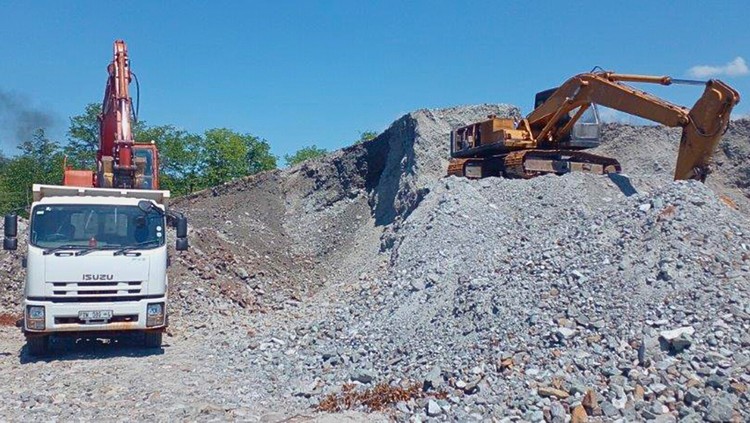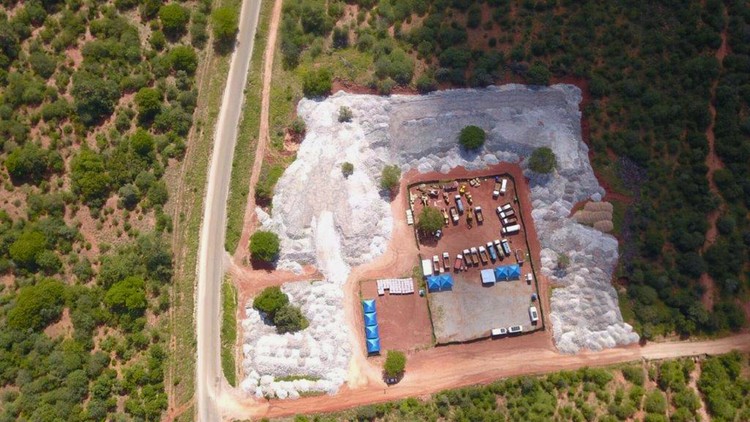Limpopo megaproject sued over “stolen” rocks
Subcontractor removed R12-million worth of white rock from private land
Construction vehicles belonging to Tshiamiso Trading 135, photographed while excavating and loading road-building materials from Boetie Visser’s old mine dumps. Photo supplied.
- A subcontractor on the multi-billion-rand Musina Makhado Special Economic Zone (MMSEZ) project removed R12-million worth of white rock, used to build roads, from a private property without permission.
- The state-owned company behind the MMSEZ is now being sued by the property owner. But MMSEZ has told the owner to collect the rocks at his own expense, before the end of the month.
- The subcontractor, Tshiamiso Trading, terminated its contract after receiving R50-million. The company has a track record of receiving controversial government contracts.
The state-owned company behind the controversial Musina-Makhado Special Economic Zone (MMSEZ) in Limpopo is facing a R12-million lawsuit after a subcontractor removed approximately 35,000 cubic meters of white rock from a private property without permission.
The MMSEZ is a multi-billion-rand megaproject launched by President Cyril Ramaphosa in 2018. More than R100-million has been spent on the project, but there are still no roads, electricity or water connections.
It has now emerged that a company subcontracted to build roads, Tshiamiso Trading 135, removed R12-million worth of white rock from an old mine dump owned by Boetie Visser Groep Kontrakteurs, without permission.
A subsequent investigation by MMSEZ SOC found that the removal of the road material by Tshiamiso is likely unlawful and criminal. But MMSEZ has not followed the investigator’s recommendations and has rejected Visser’s requests to be paid for the rocks or for the rocks to be returned.
Visser has launched a court case in the Polokwane High Court to claim the R12-million he says is owed to him. But earlier this month, MMSEZ told Visser to collect the rocks at his own expense, denying that they were responsible for the removal of the rocks.
Tshiamiso, which has a track record of receiving controversial government contracts, has since cancelled its R200-million contract, after receiving R50-million, citing standing time and ongoing court action. The company’s director, Hlamani Bruce Mohlaba, insists the rocks were lawfully removed.
Adding to the debacle is that part of the area on which this infrastructure is supposed to be built does not belong to the MMSEZ SOC, and the northern site has not been gazetted to allow for such a development.
The MMSEZ has, on several occasions, been accused of bulldozing ahead with development plans, while ignoring legal concerns and the fact that no sustainable plans are in place to secure water on the sites.
Unlawful mining
In 2022, Tshiamiso was awarded a R200-million contract with MMSEZ to build internal roads and stormwater infrastructure at the MMSEZ’s northern site at Artonvilla, north of Musina. They received an additional R100-million contract to build stormwater drainage.
On 2 August 2023, the MMSEZ obtained a permit from the Department of Mineral Resources (DMR), which allowed Tshiamiso to start mining for white rock to be used for the roads.
An old mine dump was fenced off by Tshiamiso, and the company started removing rocks and taking them to the construction site, about 2km away.
But it appears the land, in fact, was owned by Boetie Visser, of Boetie Visser Groep Kontrakteurs CC. In January 2024, Visser contacted the MMSEZ, claiming that Tshiamiso was, without permission, removing crushed stone material that belonged to him.
Visser sent several letters to the MMSEZ requesting that they halt the excavation, but Tshiamiso continued. Visser sent a proposal to the MMSEZ on 10 January, offering to sell the high-quality stones to the company. During a meeting between Visser and MMSEZ officials on 22 January, the matter was discussed, and a follow-up meeting was planned to reach an amicable resolution.
On 25 January 2024, Visser’s lawyer, advocate Elandré Bester, issued a memorandum about the unlawful removal of processed material from his old mine dumps. The memo highlighted that Visser is the lawful owner of the old mine dumps and alleged that the conduct of the MMSEZ and Tshiamiso constituted “fraud, theft, and larceny”.
MMSEZ investigates
Officials from the MMSEZ’s Legal Services and Infrastructure Development units visited the site on 6 February to investigate. They found it was “highly unlikely” that Tshiamiso was extracting material from within the permitted area and that it was “clear that the mining dumps… were outside the designated area of the borrow pit permit”.
The MMSEZ investigators also met with Visser, who presented documents to prove he was the owner of the property and had his own mining permit for the white rocks. Visser reiterated his willingness to sell the stones, failing which they should be returned.
At that stage, an estimated 35,000 cubic metres, at a value of about R12-million, of crushed stone had already been taken by Tshiamiso. It was agreed that the MMSEZ would provide Visser with feedback three days later, by 9 February 2024.
The day after the site visit, Mashile Mokono, the MMSEZ’s Senior Manager for Legal Services, compiled a report. It concluded that Tshiamiso could be charged for conducting illegal mining and committing a criminal offence, and said that the company should be held liable for damages.
The report recommended that the MMSEZ urgently instruct Tshiamiso to cease excavation, enter into negotiations with Visser to purchase the collected material, and produce records of all materials taken.
An estimated 35,000 cubic metres of “white rock” road-building material stockpiled at Tshiamiso Trading’s construction site, approximately two kilometres from Mr Boetie Visser’s mine dump. Photo supplied
Development stalled
By 9 February 2024, the MMSEZ had not provided Visser with feedback as promised. This prompted Visser to apply for an urgent interdict in the Polokwane High Court to stop the unlawful removal and ensure the materials were recovered.
But on 5 March, the matter was dismissed because of a lack of urgency.
Visser is proceeding with the court action against MMSEZ, SLM Engineers (the consulting engineers overseeing the project) and Tshiamiso and wants to be paid R12-million for the materials removed from his land.
In May this year, the MMSEZ board chairperson, Dr Nndweleni Mphephu, presented a report to the Limpopo legislature’s portfolio committee on economic development. The report revealed that Tshiamiso had terminated its R200-million contract, citing non-payment of standing time and ongoing court action. Tshiamiso had already been paid R50-million by the time of termination.
The report also revealed that the land earmarked for the project’s northern site did not belong to the MMSEZ. The land belonged to the Department of Rural Development and Land Reform. Additionally, the area designated for the northern site had not yet been gazetted.
“Come and fetch your rocks”
Visser has still not received any payment for the materials. “I have done nothing wrong. They stole my stone, moved it unlawfully, and now I’m left with a bill and legal costs amounting to half a million rand. And I still don’t have my stone back,” said Visser.
Visser claims that SLM Engineers knew that Tshiamiso had been extracting rocks from the wrong area.
In spite of his ongoing court action, Visser, on 15 July this year, received a letter from Tshifhiwa Irish Bologo, acting CEO of the MMSEZ, telling him to collect the rocks at his own expense before the end of the month.
“As you are aware, MMSEZ was not responsible for the removal of the white rock material from your site as that was done by Tshiamiso Trading without any direct or indirect involvement of MMSEZ,” stated Bologo.
This left Visser outraged. “I didn’t put it there. They put it there – their contractors. Now I must transport it back at my own expense? … My offer was simple. I said, pay me, and I’ll take my stone back. Now they’re saying no, take it back at your own cost,” said Visser.
In response to a media enquiry, Bologo said “Visser is currently engaging with MMSEZ on the removal of the white rocks.”
Bologo said that “MMSEZ is not aware of any instructions by SLM to Tshiamiso Trading to collect the white rocks and therefore no action will be taken against SLM.”
As for Tshiamiso, Bologo confirmed that the company still holds the R100-million contract for bulk sewer and waste treatment works construction.
She confirmed that a new contractor will have to be appointed to complete the internal roads and stormwater infrastructure.
In response to questions, Mohlaba, Tshiamiso’s director, said: “The removal of material occurred lawfully. The claims by Mr Visser presently form the subject matter of an application in the high court. A cost order has already been granted against Mr Visser and is in the process of execution. The application is still pending.”
SLM Engineering said that part of the matter had been dismissed with costs by the court. “Thus, in respect of the law, we cannot comment any further at the moment as this matter is before the court,” concluded Sello Matlakal, a director of SLM.
(The cost order referred to by Mohlaba and Matlakala relates only to the urgent application that was dismissed for lack of urgency, not Visser’s ongoing court case).
A controversial contractor
Mohlaba is no stranger to controversy. In 2019, Tshiamiso was taken to court by the Greater Tzaneen Municipality, which accused it of “undue enrichment” after the company was awarded a R26-million contract for the construction of a 5.8km road and stormwater drainage system. Costs escalated rapidly, and construction was halted when Tshiamiso demanded further payments.
It emerged in court that Tshiamiso had made errors in its bid calculations, which influenced the procurement process. The court ruled that the municipality’s decision to award the tender to Tshiamiso was unlawful and constitutionally invalid from the outset.
At the time, Tshiamiso was also entangled in other similar disputes. In 2016, the Makhado Municipality awarded the company contracts for the construction of two roads, where costs escalated and the projects were halted.
Tshiamiso is listed as a legal contingency in the municipality’s 2022/23 annual financial statements. At the time, the company was suing the municipality for R7.4-million in unpaid standing time, while the municipality lodged a counterclaim for R11.8-million, alleging “undue enrichment”. The outcomes of these claims remain unknown.
During the covid pandemic, Tshiamiso diversified into the medical supply sector. It was one of 42 suppliers contracted by the Limpopo provincial government to deliver masks and infrared thermometers.
This article is published in association with the Limpopo Mirror/Zoutpansberger.
Support independent journalism
Donate using Payfast

Don't miss out on the latest news
We respect your privacy, and promise we won't spam you.
Next: Elsies River residents in the dark for weeks due to Eskom backlog
Previous: Gqeberha ward councillor leads protest for services in Soweto-on-Sea
© 2025 GroundUp. This article is licensed under a Creative Commons Attribution-NoDerivatives 4.0 International License.
You may republish this article, so long as you credit the authors and GroundUp, and do not change the text. Please include a link back to the original article.
We put an invisible pixel in the article so that we can count traffic to republishers. All analytics tools are solely on our servers. We do not give our logs to any third party. Logs are deleted after two weeks. We do not use any IP address identifying information except to count regional traffic. We are solely interested in counting hits, not tracking users. If you republish, please do not delete the invisible pixel.


